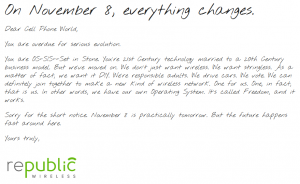 Think you are paying too much for cellular service? Then Republic Wireless may be what you have been waiting for. On November 8, Republic Wireless, a new cell phone service provider in the USA owned by Bandwidth.com, will start offering unlimited voice, text, and data for $19 per month. Too good to be true, right? Wrong. It is real — but there are strings attached.
Think you are paying too much for cellular service? Then Republic Wireless may be what you have been waiting for. On November 8, Republic Wireless, a new cell phone service provider in the USA owned by Bandwidth.com, will start offering unlimited voice, text, and data for $19 per month. Too good to be true, right? Wrong. It is real — but there are strings attached.
Republic Wireless is able to offer such low prices by a) purchasing minutes in bulk from Sprint and b) off-loading voice, text, and data onto WiFi networks when available. What does this mean? Well first and foremost, Republic Wireless will run on Sprint’s network and will utilize Sprint 3G. More importantly, however, it means people who go with Republic Wireless will need to purchase special handsets that support CDMA (to run on Sprint’s network) and UMA, also known as WiFi calling, to be able to off load onto WiFi networks. These handsets are said to be Android devices and presumably will be available directly from Republic Wireless. No word on exactly which ones will be offered or pricing.
The cool thing about Republic Wireless – aside from the price – is the fact that it claims to offer unlimited voice, text, and data; and since it runs on Sprint’s network [3G — not 4G], you will (supposedly) get coverage wherever Sprint gets coverage — or anywhere there is a WiFi network, thanks to UMA. Of course, we all know “unlimited data” is a crafty marketing term for carriers nowadays, so it is hard to say if Republic Wireless will truly offer unlimited or have soft caps. Nonetheless the prospect of getting unlimited voice, text, and data with nationwide coverage for $19 a month is attractive. Do note, however, there is no mention if this pricing will be contract-free or on-contract.
Aside from the above-mentioned, details about Republic Wireless’ offerings are sketchy. Hopefully we will find out more when November 8 comes around. One thing is for certain, however: If Republic Wireless is able to pull this off successfully (i.e. with a high service level), then it may have a lasting impact on how carriers do business in the United States.
[via GigaOM]

 Email article
Email article



